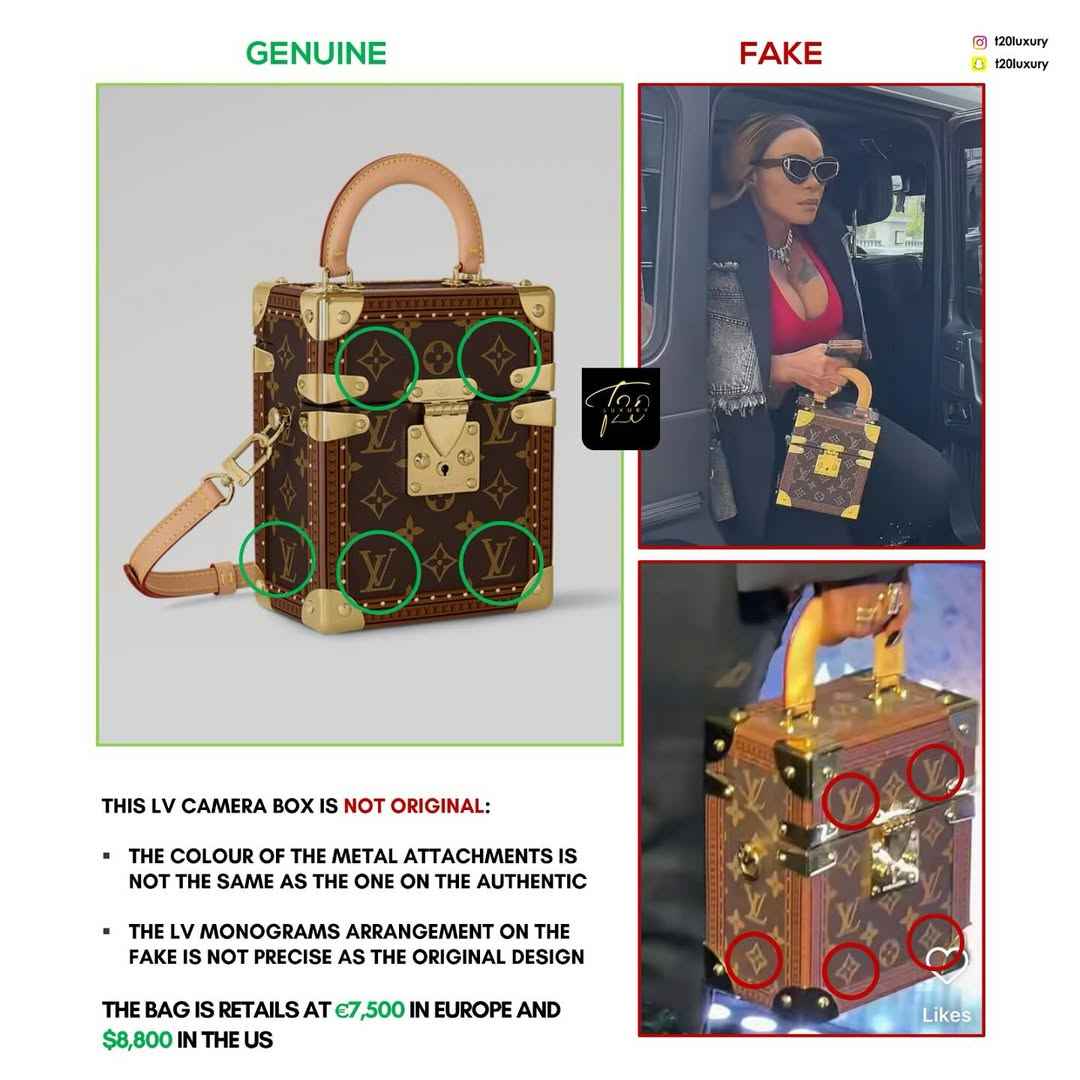Renowned Nollywood actress Iyabo Ojo has found herself at the center of a social media firestorm over allegations that she owns a counterfeit Louis Vuitton monogram camera box bag. The controversy erupted after an Instagram account, @T20luxury, known for its rigorous scrutiny of luxury items, accused her of flaunting a replica rather than an authentic piece. The incident has reignited conversations about authenticity in celebrity fashion and the pressures placed on public figures to uphold a high-end image.
@T20luxury, a platform dedicated to exposing counterfeit luxury goods, wasted no time in presenting its findings. The account shared a detailed comparison between Iyabo’s bag and an authentic Louis Vuitton version, highlighting several discrepancies. Among the key issues identified were inconsistencies in stitching, logo placement, and overall craftsmanship. These observations raised questions about the legitimacy of the bag and the authenticity of other luxury items frequently seen on the actress.
According to @T20luxury, the monogram alignment, hardware quality, and fine detailing of Iyabo’s bag failed to meet the stringent standards expected of genuine Louis Vuitton products. The account emphasized that these differences were not subtle but glaring enough to warrant further investigation. While this is not the first time the platform has called out celebrities for allegedly using counterfeit luxury items, Iyabo Ojo’s case has drawn particular attention due to her influential role in Nollywood and her substantial social media following.
The controversy has sparked a wave of reactions on social media, ranging from humor to serious commentary. Some users took a lighthearted approach, joking about the possibility of the bag being carried upside down or suggesting alternative explanations. Others delved deeper into the implications of the situation, discussing the broader themes of authenticity and the pressures faced by celebrities to maintain an image of wealth and exclusivity.
@de_law22 quipped, “Maybe she’s carrying the bag upside down 😂 😂 😂,” while @tundewearitall humorously remarked, “Everybody dey collect.” Meanwhile, @aremooba_ expressed frustration, writing, “T20 Go reach everybody for 9ja movie industry🤞,” implying that the scrutiny should extend to others in the industry.
More serious reflections came from accounts like @fragilegram, which praised the callout as “very respectable” and humorously greeted Iyabo Ojo with, “Queen Mother bawo 😂 😂 😂.” Another user, @osuputuputu, suggested a constructive solution: “Make she patronize and promote her daughter’s bags nah instead of all this fugazi,” implying that the actress could support local talent by promoting authentic, locally made products.
The debate surrounding the incident extends beyond mere fashion. Many have pointed out the financial implications of purchasing counterfeit goods, with @believeability_ stating, “Don’t buy fake things with real money,” and @__zamanii reinforcing the idea that “you mustn’t wear fake things to look good and admirable.” These comments reflect a growing awareness of the ethical and financial risks associated with counterfeit luxury items.
This controversy also highlights the double standard often applied to celebrities. While the public expects them to maintain an image of wealth and success, they are increasingly scrutinized for every purchase they make. Iyabo Ojo’s case serves as a microcosm of this phenomenon, where the line between authenticity and appearance becomes blurred.
For Iyabo Ojo, the fallout from this incident extends beyond social media. As a prominent figure in Nollywood, her reputation and credibility could be impacted if the allegations prove true. The actress has yet to respond publicly, leaving fans and critics alike eager for clarification. Will she address the claims directly, or will she let the matter rest without comment?
The conversation sparked by this controversy underscores the complexities of maintaining a glamorous public persona in today’s digital age. It also raises important questions about consumer behavior and the ethics of purchasing counterfeit goods. While the debate rages on, one thing remains clear: the spotlight on Iyabo Ojo’s bag has brought to light issues that resonate far beyond the realm of fashion.
As the dust settles, the incident serves as a reminder of the delicate balance between image and reality in the public eye. Whether the accusations are founded or not, the episode has undoubtedly left its mark on both Iyabo Ojo and the broader discourse on authenticity in celebrity culture. In a world where appearances often overshadow substance, this controversy offers a rare glimpse into the vulnerabilities beneath the surface.



